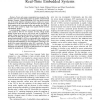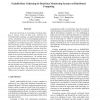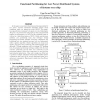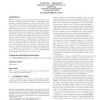38 search results - page 4 / 8 » Voltage-Clock-Scaling Adaptive Scheduling Techniques for Low... |
CODES
2009
IEEE
14 years 16 days ago
2009
IEEE
Time redundancy (rollback-recovery) and hardware redundancy are commonly used in real-time systems to achieve fault tolerance. From an energy consumption point of view, time redun...
ISQED
2008
IEEE
14 years 4 days ago
2008
IEEE
—Power and energy consumption has emerged as the premier and most constraining aspect in modern computational systems. Dynamic Voltage Scheduling (DVS) has been provably one of t...
CCGRID
2008
IEEE
14 years 7 days ago
2008
IEEE
Real-time monitoring is increasingly becoming important in various scenes of large scale, multi-site distributed/parallel computing, e.g, understanding behavior of systems, schedu...
VLSID
2002
IEEE
14 years 6 months ago
2002
IEEE
In this paper, we present a functional partitioning method for low power real-time distributed embedded systems whose constituent nodes are systems-on-a-chip (SOCs). The systemlev...
CASES
2004
ACM
13 years 11 months ago
2004
ACM
While the dynamic voltage scaling (DVS) techniques are efficient in reducing the dynamic energy consumption for the processor, varying voltage alone becomes less effective for t...




